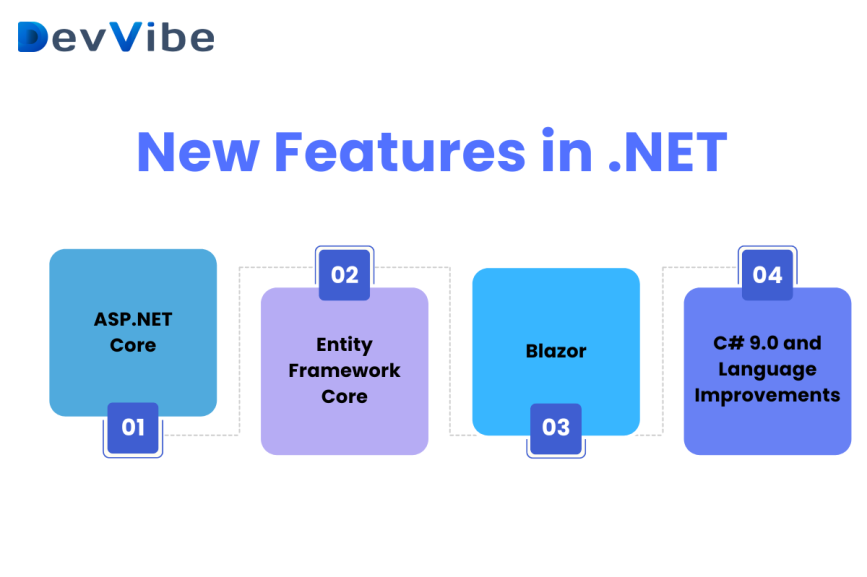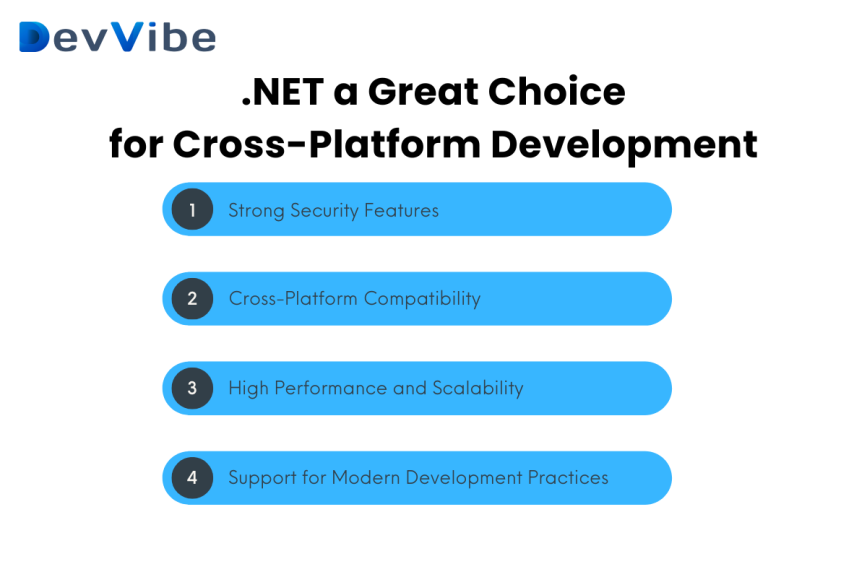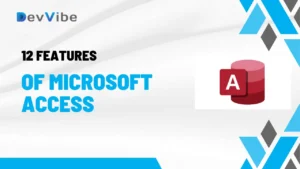
Why Choose .NET for Cross Platform Development?
Strategic decisions play a pivotal role in ensuring a product’s success, especially when it comes to selecting the right development framework. One of the most important decisions project managers have to make is choosing the right platform for developing and distributing their product. While there are several development platforms available, the .NET framework stands out as a unique solution, offering numerous benefits that make it an ideal choice for cross platform development.
This article will explain .NET, exploring its unique qualities, capabilities, and the significant distinctions between .NET and the traditional .NET Framework. We’ll also discuss its cross-platform compatibility, containerization features, performance improvements, and the future of .NET. So, get ready to discover why .NET is a fantastic choice for creating modern applications.
What is .NET?
Simply put, .NET is a cross-platform, free, and open-source framework designed to create modern applications. Whether you’re a fan of Windows, Linux, or Mac, .NET has you covered. It’s important to understand that when people refer to “.NET,” they often think of the “.NET Framework,” but there’s more to it than that. While the .NET Framework and .NET share some similarities, .NET is newer and built with distinct goals in mind.
Explanation .NET Framework for Cross Platform Development
Cross-platform development is all about creating applications that run smoothly on multiple platforms. With a single codebase, developers can create native-looking apps for different platforms, like Windows, Android, and iOS, without having to write separate code for each. This method saves time and effort, making it a popular choice for developers.
The Benefits of Choosing .NET for Cross Platform Development
Less Time and Effort Spent on Development
The .NET framework streamlines application development, through its robust cross-platform functionality. Developers can write code once and have it run on various operating systems like Windows, Linux, and macOS. This saves time and money by eliminating the need for separate development for each platform. The .NET framework also offers a wide array of templates and tools to help developers create self-sufficient microservices and high-performing cloud applications.
Simple Deployment and Verification
The .NET framework simplifies and accelerates testing and deployment. Its stand-alone nature allows developers to see code changes without needing to redeploy the application, speeding up the testing process. The framework also includes a built-in database for test automation and unit testing. Developers can choose between framework-dependent and self-contained deployment options, facilitating seamless application deployment across different environments.
A Vast Collection of Pre-Existing Framework Code
.NET offers a vast library of pre-written code blocks, maintained by the .NET community and Microsoft. These code blocks can be easily used and customized for any development project, reducing time to market and simplifying the creation of applications. The .NET community also serves as a valuable resource for developers, offering support, ideas, and innovative solutions to challenges.
What is Cross Platform Development?
Cross-platform development aims to create a single application that functions identically on all platforms. Unlike native development, which relies on specific programming languages and tools for each platform, cross-platform development uses platform-agnostic technologies like HTML, JavaScript, and CSS. Developers can write the app’s logic once and reuse it across multiple platforms, speeding up the development process and ensuring a consistent user experience.
Explanation of New Features in .NET
.NET Core offers several powerful features that make it a great choice for web application development. Here are some of the most important ones:
ASP.NET Core
ASP.NET Core is a modern, cloud-ready web framework built on top of .NET. It offers a modular approach to creating web applications, with features like dependency injection, built-in support for RESTful APIs, and seamless integration with popular front-end frameworks.
Entity Framework Core
Entity Framework Core is an object-relational mapping (ORM) framework for .NET. It simplifies database interaction and management by providing a higher-level abstraction. With features such as automated change tracking and easy testability, developers can focus on application logic instead of complex SQL queries.
C# 9.0 and Language Improvements
C# is the primary language for .NET developers, and C# 9.0 brings several enhancements that make coding more concise and expressive. New features like records, improved pattern matching, and enhanced nullability reduce the likelihood of errors and make coding more efficient.
Blazor
Blazor is a revolutionary web framework that allows C# developers to build interactive client-side web applications. By using C# for both front-end and back-end development, Blazor eliminates the need for JavaScript, simplifying the development process and creating a more enjoyable experience for developers.
Why is .NET a Great Choice for Cross Platform Development?
High Performance and Scalability
.NET is known for its high performance and scalability. It provides tools and features that help developers build applications that can handle high traffic and large volumes of data. This makes it an ideal choice for building enterprise-level applications that require speed and efficiency.
Strong Security Features
Security is paramount for any application, and .NET offers robust security features to safeguard against threats. It includes built-in authentication and authorization features, as well as tools for managing user identities and access control.
Support for Modern Development Practices
.NET supports modern development practices like DevOps, continuous integration, and continuous delivery. It integrates seamlessly with popular development tools and platforms, making it easy to implement automated testing, deployment, and monitoring.
.Net Cross-Platform Compatibility
One of the biggest advantages of .NET is its cross-platform compatibility. Developers can build applications that run on multiple operating systems without having to rewrite code for each platform. This saves time and resources, making .NET a cost-effective solution for cross platform development.
Future of .NET
.NET is continuously evolving, with regular updates and new features being added to keep it relevant and competitive. The future roadmap for .NET includes enhanced performance, security, and developer experience, along with increased support for cloud-native development and AI-driven applications.
Conclusion
.NET is a powerful and versatile framework that offers numerous benefits for cross platform development. Its cross-platform compatibility, high performance, scalability, and strong security features make it an ideal choice for building modern applications. Whether you’re a seasoned developer or just starting out, .NET provides the tools and support you need to create high-quality applications that run smoothly on any platform.
DevVibe is a leading software company with extensive expertise in .NET framework development. Our team excels in creating robust, scalable applications using the latest .NET technologies. We offer comprehensive solutions tailored to meet diverse client needs, ensuring optimal performance and security. With a strong focus on innovation, Devvibe is committed to delivering top-quality software solutions that drive business success
FAQs
What is .NET?
.NET is a cross-platform, open-source framework for building modern applications that run on Windows, Linux, and macOS.
Why is .NET popular for cross-platform development?
.NET is popular for cross-platform development because it allows developers to write code once and run it on multiple platforms, saving time and resources.
What are the key features of .NET?
Key features of .NET include ASP.NET Core, Entity Framework Core, C# 9.0, and Blazor, which provide tools for web development, database management, and interactive web applications.
How does .NET support modern development practices?
.NET supports modern development practices like DevOps, continuous integration, and continuous delivery, integrating seamlessly with popular development tools and platforms.
What is the future of .NET?
The future of .NET includes improvements in performance, security, and developer experience, as well as enhanced support for cloud-native development and AI-driven applications.










